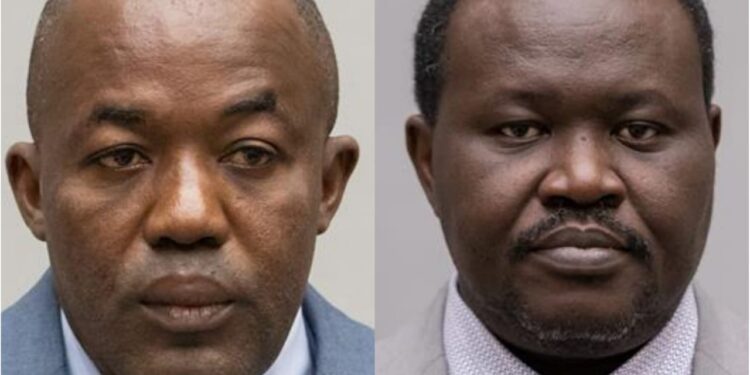By Waceke Njoroge
The trial of Central African Republic nationals Alfred Yekatom and Patrice-Edouard Ngaïssona at the International Criminal Court in The Hague has taken a break until November 29, 2021, when the prosecution’s 22nd witness is expected to take the stand.
The trial against the two opened on February 16, 2021 before Judge Bertram Schmitt, Judge Péter Kovács, and Judge Chang-ho Chung of Trial Chamber V. The latest hearing started on November 1, 2021, with the prosecution continuing to present its witnesses.
Yekatom and Ngaïssona are facing crimes against humanity in the form of murder, deportation or forcible transfer of population, imprisonment or other severe deprivation of physical liberty, torture, persecution, and other inhumane acts; and war crimes of murder, torture and cruel treatment, mutilation, intentional attack against the civilian population, intentional attack against buildings dedicated to religion, enlistment of children under the age of 15 years and their use to participate actively in hostilities, displacement of the civilian population, and destruction of the adversary’s property.
The crimes were allegedly committed in various locations in the Central African Republic (CAR) – Bangui, including Cattin, Boeing; Yamwara School, and the PK9-Mbaïki Axis.
Their case arises from the situation in CAR. Pre-Trial Chamber II found that there were substantial grounds to believe that, between September 2013 and December 2014, an armed conflict that constituted to organised armed war was ongoing in the territory of the Central African Republic between the Seleka and the Anti-Balaka. The Anti-Balaka carried out widespread attacks against the Muslim civilian population, which was perceived, on the basis of their religious or ethnic affiliation, to support the Seleka.
Yekatom and Ngaïssona were held responsible due to their capacity as leaders of the armed group. Yekatom, a former caporal-chef (master corporal) in the CAR army – Forces Armées Centrafricaines – and a member of parliament, is alleged to have commanded a group of around 3,000 Anti-Balaka movement members.
Ngaissona, a former sports minister in CAR and African football executive, is said to have been a senior leader and “national coordinator” of Anti-Balaka militias in 2013 and 2014, and he and Yekatom are accused of coordinating attacks against the country’s Muslim population during that period. The former French colony was plunged into turmoil in 2013 when Muslim rebels from the Seleka group seized power.
A band of mostly Christian militias, called the anti-Balaka, rose up to counter the Seleka after President François Bozizé was deposed.
Yekatom’s counsel – Mylène Dimitri, Thomas Hannis, and Anta Guissé – on November 15, 2021 submitted a communication report regarding disclosure of evidence in response to the prosecution’s request.
The disclosure is in regard to the testimony given by a witness who was confirmed to have died. The prosecution requested a formal submission of the recorded testimony, in accordance with the rules. The statement supports Yekatom’s actions and conduct at the Yamwara School Base.
Yekatom was surrendered to the ICC on November 17, 2018, while Ngaïssona was arrested by the authorities in France on December 12, 2018, and transferred to the ICC Detention Centre on January 23, 2019. Yekatom initially appeared before Pre-Trial Chamber II on November 23, 2018, while Ngaïssona went before the court on January 25, 2019. Their cases were joined on February 20, 2019.
Ngaïssona is represented by Geert-Jan Alexander Knoops, Richard Omissé-Namkeamaï, and Marie-Hélène Proulx.
The charges against the two were confirmed on December 11, 2019, after a hearing that took place from September 19-25, 2019, with closing statements on October 11, 2019. Pre-Trial Chamber II issued a unanimous decision partially confirming the charges of war crimes and crimes against humanity against Yekatom and Ngaïssona and committed them to trial. It declined to confirm some of the charges brought by the prosecution due to insufficient evidence.
On March 11, 2020 the chamber rejected the prosecution’s request to reconsider the charges or, alternatively, allow it to appeal the decision.
The court adjourned after the opening of the trial and resumed on March 15,2021, when the prosecution began to present its evidence and call witnesses.
Initially, the judges allowed 325 victims to participate in the trial, but this number has continued to evolve as more submit their requests. The judges appointed two separate teams of lawyers to represent two groups of victims authorised to participate. One group is composed of former child soldiers and the other victims of other crimes.
The former child soldiers are represented by Dmytro Suprun, while the other victims’ lawyers are Marie-Edith Douzima Lawson, Abdou Dangabo, Paolina Massidda, Yaré Fall, and Elisabeth Rabesandratana.







